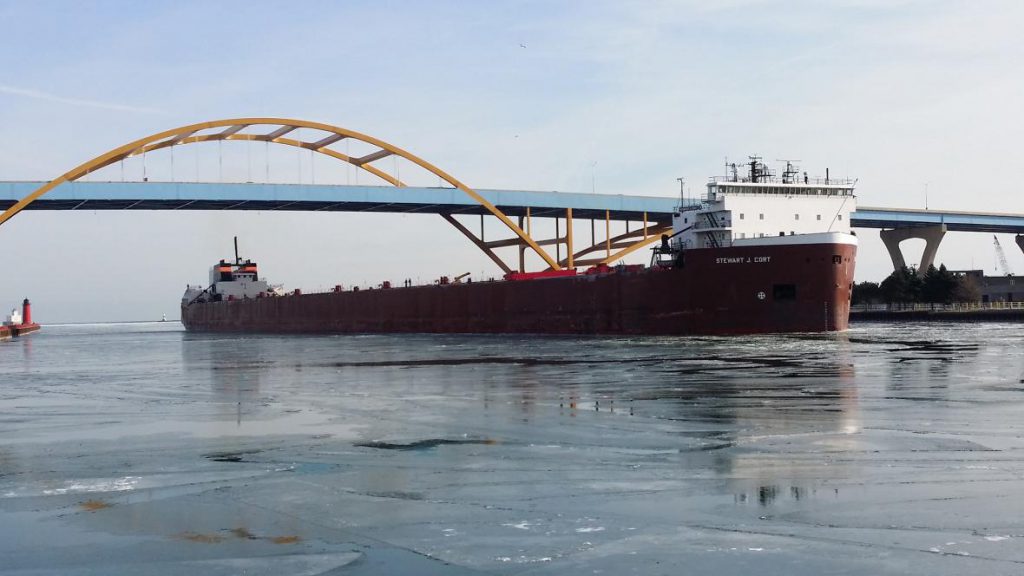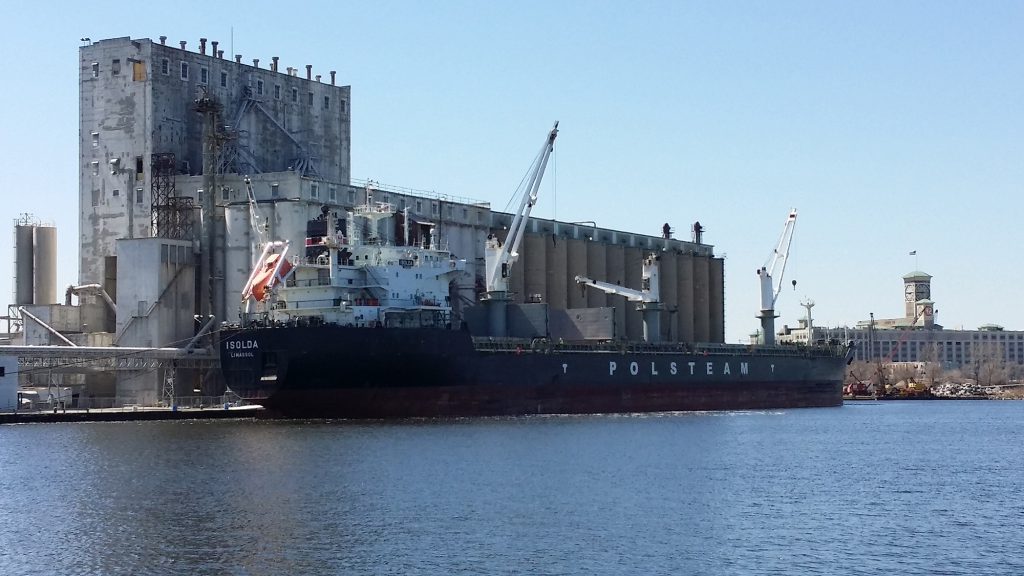Tariffs Affecting Great Lakes Ports
Port Milwaukee’s traffic was down in 2018, but other ports in state see an increase.

The Great Lakes freighter Stewart J. Cort passes through the Port of Milwaukee in 2017. Photo courtesy Port of Milwaukee.
Pointing to a strong economy driving demand for products — and in some cases tariffs — some Great Lakes ports are reporting that 2018 saw an uptick in the cargo moving through their waters.
Adele Yorde with the Duluth Seaway Port Authority said the only thing that may keep the Twin Ports from another record year for iron ore cargo shipped is a slow start to the shipping season last spring.
“We did have some issues with ice. The late March and early April shipments were down,” she said. “As the year went by, everything picked up, but those total numbers may not reflect just how strong the season might have been had they been able to move full-strength when the locks opened last March.”
“Whether we can directly attribute it to the tariffs, at least there was strong production, strong demand for the steel-making industry along the Great Lakes,” she said. “If you’re going to point cause and effect, I’m sure that there was a definite impact by allowing those steel manufacturers to order domestic product.”
President Donald Trump announced tariffs of up to 25 percent on steel and aluminum in March. Those tariffs went into full effect in June.
Grain shipments were also up in the Twin Ports about 22 percent from 2017. Yorde said they also saw the first bulk shipment of soybeans after more than a decade as a direct result of tariffs. Typically, Midwestern farmers move soybean shipments by rail to ports on the West Coast or by river barges to the Gulf Coast ports for shipments to Asian markets. China placed a retaliatory tariff of 25 percent on U.S. soybean imports in early July.

The Isolda is part of Polsteam’s Great Lakes Fleet. The bulk carrier stopped at the Port of Milwaukee to load grain for shipment. Photo courtesy of Port of Milwaukee.
Dean Haen, director of the Port of Green Bay, said the port has been unaffected by tariffs because it largely handles limestone and petroleum products.
“Other Wisconsin ports are dealing with those situations, but we’re not moving aluminum or steel, which are up against tariffs,” said Haen. “And, we’re not seeing the export of agricultural products through the Port of Green Bay.”
The port moved 1.9 million metric tons by the end of November 2018, and was on track to see two million metric tons of cargo or more by the season’s end. In contrast, around 1.8 million tons of cargo moved through the Port of Green Bay in 2017. Haen expects the momentum to continue through the start of the 2019 shipping season.
“Once we get to summer, we’ll have to see, but at least the next six months, all indications are the economy is doing well and we’re going to be moving a lot of things by water,” said Haen.
Meanwhile, the Port of Milwaukee has seen impacts to imports and exports as a result of tariffs.
“But, that sort of encouraged the port to look at other export markets,” said Schlicht. “A lot of Wisconsin grain this year from the Port of Milwaukee went to new and developing economies like the country of Tunisia, for example.”
While inbound steel shipments from Europe remained strong, Schlicht said imports fell 6 percent.
“Essentially, the Port of Milwaukee handles specific steel materials that will need to be imported in a global steel marketplace here in southeastern Wisconsin regardless of the tariff environment,” he said.
Salt shipments at the port were also down about 19 percent from 2017 due to a 12-week strike at a Canadian salt mine in September 2018. However, the port saw a 67 percent increase in liquid bulk cargo. In addition, Schlicht said they saw an overall increase in international cargo, marking the fifth consecutive year of strong volumes. The Port of Milwaukee moved around 2.6 million metric tons of cargo last year with final numbers from the 2018 shipping season yet to be released.
The locks at Sault Ste. Marie, Michigan, are set to close Jan. 15, 2019.
Listen to the WPR report here.
Some Great Lakes Ports See Continued Uptick In Cargo Volumes was originally published by Wisconsin Public Radio.
More about the Trump Tariffs
- Op Ed: Trump Tariffs Have Failed - John Torinus - Sep 27th, 2020
- Murphy’s Law: Trump Tariffs Slam Wisconsin Economy - Bruce Murphy - Jun 29th, 2020
- Baldwin Calling on Trump Administration to Take Action and Support Wisconsin Hardwood Businesses Hurt by Trade War - U.S. Sen. Tammy Baldwin - Feb 25th, 2020
- Trade War Wounds May Heal Soon - Erik Gunn - Feb 21st, 2020
- How China Trade Agreement Impacts Wisconsin Farmers - Miranda Suarez - Jan 16th, 2020
- Trump Tariffs Have Cost State $800 Million - Miranda Suarez - Dec 10th, 2019
- U.S. Senator Tammy Baldwin Seeks Investigation into Possible Market Manipulation Regarding Market Bets Timed to Trump’s Comments on Trade War & Other Geopolitical Events - U.S. Sen. Tammy Baldwin - Oct 21st, 2019
- Port Milwaukee Shipping Up in 2019 - Danielle Kaeding - Oct 21st, 2019
- Stuck to Gallagher: Does Your Party Care About Small Business? - State Rep. Amanda Stuck - Oct 10th, 2019
- Evers Blasts Trump “Tweet” Trade Wars - Erik Gunn - Sep 16th, 2019
Read more about Trump Tariffs here





















